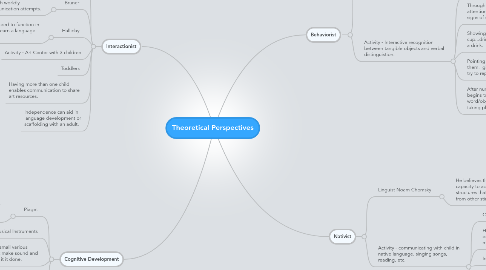
1. Cognitive Development
1.1. Piaget
1.1.1. For language to develop, specific cognitive growth must occur first.
1.2. Activity: Musical Instruments
1.3. Giving children small various instruments that make sound and show them how it it done.
1.4. Once they learn and experience it for themselves they are able to get creative in making sound.
1.5. when the child has prior experience, they can now use that knowledge as well as new development to manipulate the instruments.
2. Interactionist
2.1. Vygotsky
2.1.1. Language development is influenced by the society in which individual lives
2.2. Bruner
2.2.1. Children language builds through worldly communication attempts.
2.3. Halliday
2.3.1. Language develops due to a need to function in society that the demand is to learn a language to become part of society
2.4. Activity - Art Center with 3 children
2.5. Toddlers
2.6. Having more than one child enables communication to share art resources.
2.7. Independence can aid in language development or scaffolding with an adult.
3. Nativist
3.1. Linguist Noam Chomsky
3.1.1. He believes that people inherently have the capacity to acquire language due to cognitive structures that process language diffentently from other stimuli.
3.2. Activity - communicating with child in native language, singing songs, reading, etc.
3.2.1. Children begin to teach themselves language
3.2.2. Hypothesis tesing - children begin to experiment on how language is spoken and manipulated and articulated.
3.2.3. Infant - Young adult
3.2.4. Children are innately born with the capability to naturally develop the language they are born into and learn how to use it - Language Acquistion Device (LAD)
4. Behaviorist
4.1. B. Skinner
4.1.1. Language is learned based on the reinforcements that occur in the environment and associations.
4.2. Activity - Interactive recognition between tangible objects and verbal distinguistion.
4.2.1. Infant - Toddler
4.2.2. Through operant conditioning, the child has full attention, repetition, and then able to show signs of enforcing task at hand.
4.2.3. Showing a cup with water in it...saying cup...drink - giving the child a chance to take a drink. Repeating the same sentence.
4.2.4. Pointing out various body parts and naming them. giving the child a chance to reply and try to repeat.
4.2.5. After numerous times of repeating words, child begins to develop language and verbalizes the word/object due to the reinforcement of what is taking place around him.
